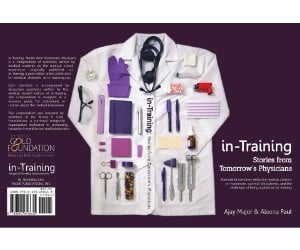It is not just nostalgia and excitement that grips me as I am nearing the end of medical school. A part of me is terrified at the thought of finally having to own that white coat, to be the person in charge. There is another part (though not as dominant) that is filled partly with regret. Regret over the things I didn’t do, the things I could have done differently, the moments I missed, the unnecessary anxieties…
Humanitarian Opportunities for Medical and Pre-Med Students
Although repeated to the point of being cliche, “to help people” is one of the most popular answers would-be doctors give when asked why they want to go into medicine. The great news is that there are many humanitarian work opportunities for pre-med students, med students and even new doctors to undertake that will not only hone their clinical skills and make them more culturally competent physicians, but also allow them to give medical care to those who might not otherwise receive it.
Not “Ours” Anymore: Sharing Our Doctor Spouses
By Amy Rakowczyk
One thing is certain during medical school: your medical spouse is going to study and work a lot of hours. This is a necessary part of becoming a doctor. They need years of studying, preparing, and training in order to be able to perform the job. The time required means that you, the medical student spouse/partner, will have less time with them. There will be fewer hours when they are available. That is the hard reality.
It’s easy to start thinking about how unfair this is. You are left with gaping holes of time and are by default in charge of all the non-medical school items. You are working harder too, with less support. The unfairness of it can quickly turn into resentment and bitterness.
An Introduction to Student Loans
Consider these three questions. First, what is a loan? Second, how is it typically is structured? Third, do you know how much you will be paying back if you borrowed x amount? I always wished someone had personally educated me and answered these very questions.
It has been almost 20 years since I chose my college (an expensive one), and almost 10 since I made my decision to pursue a career in pharmacy (a smarter choice, but still expensive one). I consider myself fortunate because my profession (for the most part) allows me to pay back the student loan I have accumulated and still enjoy a lifestyle I had imagined.
A Scribe Case Study: Alyssa Kettler
When did you first hear about medical scribes?
I first heard the term ‘medical scribe’ from a friend of my mother, a nurse at Fairview Hospice. She knew that I was looking for meaningful work to undertake before pursuing medical school and suggested I explore scribe opportunities. After extensive online research, I began scribe training with Elite Medical Scribes.
Book Review | in-Training: Stories from Tomorrow’s Physicians
In early 2012, medical students Ajay Major and Aleena Paul started in-Training.org, a website dedicated to the medical student community at large with a goal—according to the site—to become “the intellectual center for news, commentary, and the free expression of the medical student voice.” Since then, the site has grown by leaps and bounds, recently celebrating their 1000th article publication. Four years after the launch of the website, Major and Paul—who are now beginning their residency training—compiled around 100 of these essays into a book: in-Training: Stories from Tomorrow’s Physicians.
On Being a Medical Student
Republished with permission from here. Earlier in the summer, I was speaking with a friend … Read more
Five Tips for Staying Healthy and Productive in School
While your dream of getting accepted to medical school probably involves countless nights studying, hundreds of volunteer hours, and a very long application process, taking time for yourself may not always be at the top of your priority list. What many aspiring doctors tend to forget is that taking some time to relax can actually boost your productivity once you get back to work.
Answering The Most Common Question in Medical Education
Central to the skillset of every physician is the differential diagnosis; this is the process by which new patients are evaluated to establish the most likely diagnosis. Similarly, the first clinical year of medical school is like a differential for each student, except instead of a medical diagnosis, students are seeking to determine which specialty they will choose. This column explores this differential: experiences from each rotation by a current third year student.
Doctors-in-training have heard this question thousands of times, beginning the moment they announced their intentions to pursue a career as a physician: The question, of course, is some variant of “What kind of doctor do you want to be?” Before I interviewed for medical school, I was told to answer noncommittally; it was suggested that, if I already knew what kind of doctor I planned to become, it would imply the clinical years weren’t important to me. I was told to leave it open-ended so as not to rule any specialty out too early. I see the value in that—looking back, how could I have possibly had a good idea, given my limited clinical exposure before medical school? Even for students that do have clinical experience, it’s easy to imagine they could change their minds and, regardless, should be open to learning from the clinical years. Similarly, we were told not to answer too definitively during third year either—the idea being that if we tell an attending what we want to do, and it isn’t the specialty we are currently working with, we will be permanently alienating ourselves from that profession.
Conquering Organic Chemistry
Organic Chemistry is a hurdle every premed must undertake. For many, it can dissuade you from pursuing your dreams of becoming a physician. This guide is here to prevent that, and instead help you come to terms with the beast commonly referred to as “orgo” or “ochem.”
First and foremost, let’s debunk a couple myths surrounding the subject.
How Test Prep Prepares Me To Be An Effective Physician
Before medical school, the dream of becoming a physician involves helping people and curing disease. During medical school, that dream matures through educational and clinical experiences into a realization that being a physician is something much deeper, a permanent responsibility that only those who are doctors themselves will understand.
Every patient is a trial and error that can lead to life or death. Is the abdominal pain just constipation, a brewing appendicitis, or even worse, colon cancer? Is the patient presentation worthy of simple reassurance, or perhaps blood work, or—to be safe—diagnostic imaging?
Managing Anxiety on Test Day
Taking the MCAT can be a nerve-wracking experience. In fact, many students develop significant test anxiety as a result of the MCAT’s role in the medical school admissions process. If this scenario describes you, here are several tips to help you successfully manage this anxiety:
1. Review difficult details and concepts on your test day
As you study for the MCAT, proactively compile a list of those details and concepts that you consistently struggle to understand. On the morning of your exam, wake up an hour early to review this list. This can help you refresh your memory and begin the MCAT in a much calmer mood.
What Students Should Know About Post-Baccalaureate Pre-Medical Programs—Part Two: SMP Students
In Part One of this series, we discussed post-baccalaureate pre-medical programs for career-changers (i.e. those who have not yet taken any of their medical school prerequisites). In this article, we will address a different kind of post-baccalaureate program—the Special Master’s Program, or SMP—that is designed for pre-medical students who need to show academic preparedness via additional coursework before applying to medical school.
Let’s face it—one of the most important components of your medical school application is your numerical data. Is your MCAT score competitive? Is your BCPM GPA strong? For many medical school hopefuls, falling short on one or more of these aspects is a frightening reality. And while studying for and retaking the MCAT is a relatively simple way to address weaknesses in your test results, remedying a low GPA can be trickier.
Managing Bipolar Disorder in Medical School
Two days before interviewing at the medical school I now attend, I couldn’t get out of bed. At the nadir of my eighth major depressive episode in eight years, I seriously considered whether I could make the trip. Thankfully, I did. And thankfully, six days after that interview I met the psychiatrist who would finally piece together my long and steadily worsening psychiatric history.
I sat in his office, quiet and dulled compared to my spring and summer self, and began recounting my story – the weightiness of my current depression, the semester in college marked by a mere two to four hours of sleep a night (“insomnia” according to my doctor then), and the clockwork nature of my mood changes each year. Within ten minutes, he stopped me mid-sentence and said, almost casually, “You know, you show a lot of signs of bipolar disorder.”
How My Research Degree Taught Me I’m Not a Surgeon
Recognizing the connection between lab work and surgery
What surprised me the most during my medical school journey was that it was primarily lab work, not my surgery rotation, that taught me I was not a surgeon. The type of experience my lab work entailed had absolutely nothing to do with surgery or clinical medicine, so it was a peculiar and fortuitous realization. I do not believe when entering medical school that I had ever thought about doing research, but our program strongly advocated it. I met with various advisors in first year and decided I was going to transition into the combined PhD program.
Expectations: Defining What You Can Expect With Your Spouse
Updated September 6, 2021. The article was updated to correct minor grammatical errors. Expectations. The … Read more
How Nontraditional Students Can Best Position Themselves When Applying to Med School
A friend of mine studied film in college and subsequently found himself working as a cameraman for a documentary television program about the lives of EMTs and ER physicians. He experienced some very tense situations, and from his work decided that he wanted to do more than document how people received medical care—his desire was to participate in the action of helping others as a doctor.
Unfortunately, his film education was the furthest possible undergrad experience he could have from pre-med. He had no applicable science credits, no anatomy or physiology, and the only shadowing he had done of physicians had been with a camera in hand. In short, his path would be an arduous one, and he was soon going to turn 31.
A Portrait of Obstetrics & Gynecology
Central to the skillset of every physician is the differential diagnosis; this is the process by which new patients are evaluated to establish the most likely diagnosis. Similarly, the first clinical year of medical school is like a differential for each student, except instead of a medical diagnosis, students are seeking to determine which specialty they will choose. This column explores this differential: experiences from each rotation by a current third year student.
Having finished my first rotation, Women’s Health Clerkship, I’d like to offer a short look into the specialty, sharing some of my observations the last few weeks. As I have said often over the past two months, I believe this was the perfect rotation to kick off third year. OB/GYNs have a wide scope of practice, and their field contains elements of many other specialties. During this rotation I was exposed to clinical medicine, by which I mean the art of seeing patients in a clinical setting, spending a few minutes with each, and using history and physical exam skills to offer a diagnosis and treatment plan. I was also exposed to surgery. I hadn’t realized just how surgical of a specialty it is, or at least can be, depending on how a doctor chooses to practice. (More on that later.) I also saw some inpatient medicine, managing patients in a hospital setting and consulting with other specialties as needed. And of course, OB/GYNs have a very unique aspect of medicine that is theirs alone: the labor & delivery floor. This breadth of practice settings was an excellent introduction to many aspects of medicine that I’m only beginning to understand.
Anonymous: How Mental Illness Gets Overlooked In The Hospital
Reposted from here with permission The day Mr. Webster appeared on our service, I was late for … Read more


















